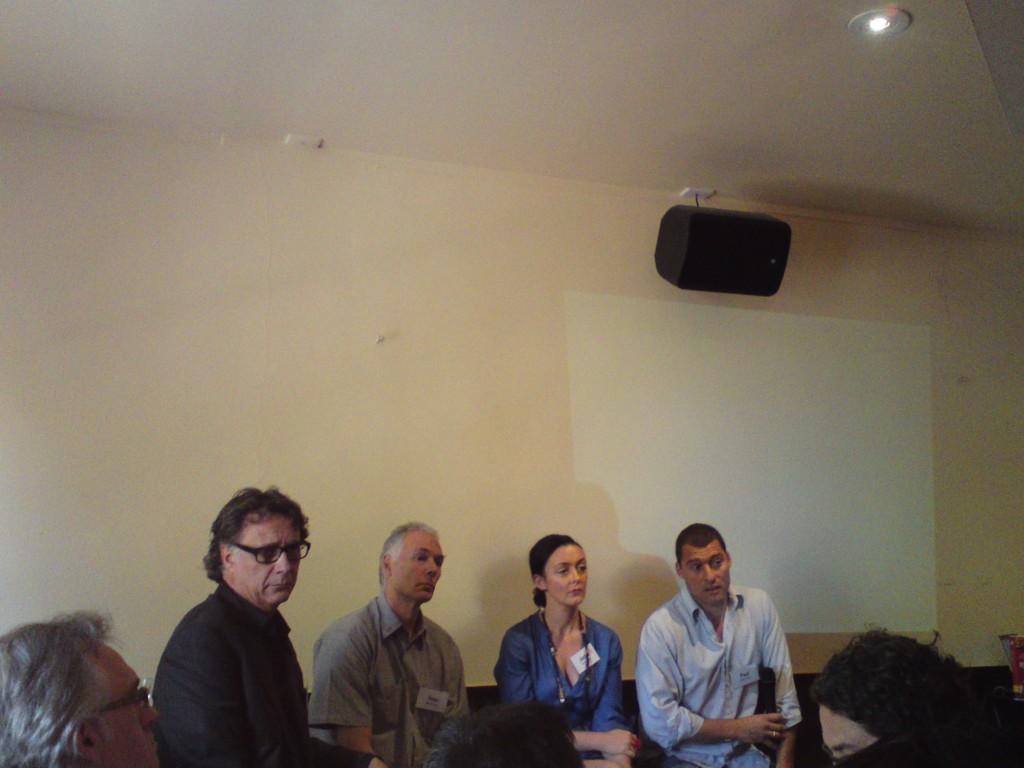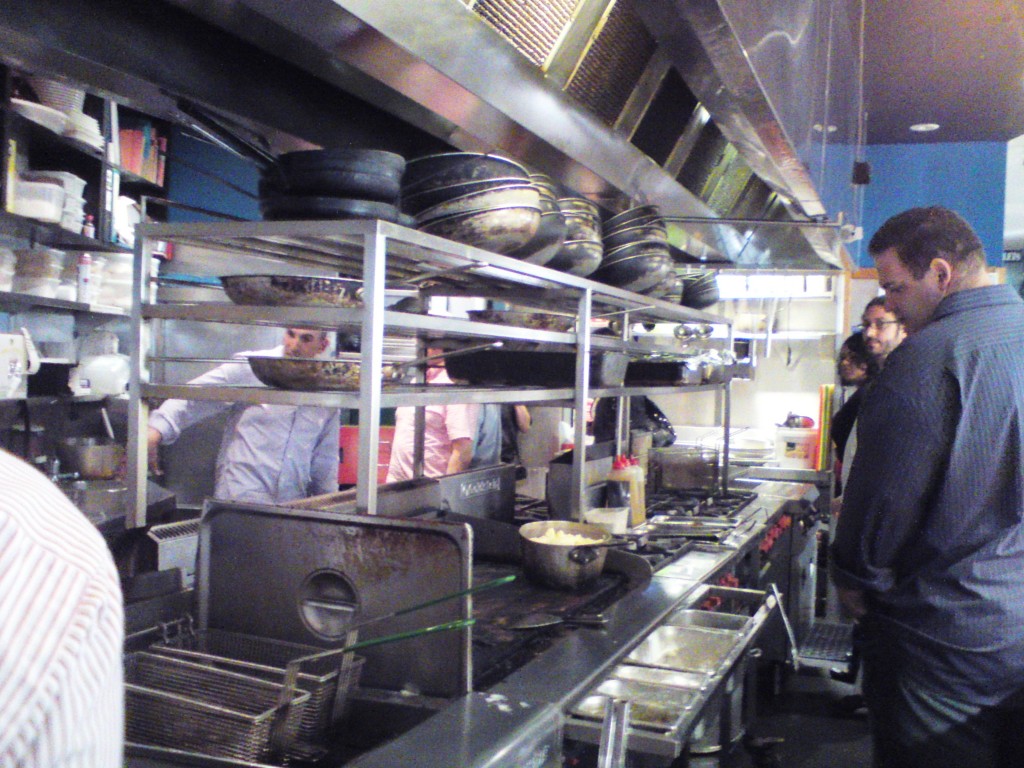As part of the Melbourne Food & Wine Festival, I attended the workshop – Starting a Cafe or Restaurant presented by Ken Burgin of Profitable Hospitality. During the course of the day, I was asked if could do a quick impromptu guest presentation on the marketing side of things and of course, about the role of food bloggers. I was a little taken back by the suggestion as I came purely as an observer and was unprepared for a presentation, but with my background in marketing, advertising, operations management and having worked in hospitality, I gave it my best shot! Yelp…
The workshop provided the opportunity to learn from some of the the best in the industry from starting up a cafe to the running operations side of the business but it also focused on the legal matters, leasing, kitchen fit outs and the general pitfalls to be wary of. The point of the workshop was to highlight the good and the bad, particularly highlighting the financial results that many underestimate.
For anyone who is thinking of starting up a food business, this workshop should be your first stop. Ken Burgin has been in the industry for more than 25 years having owned several cafes and restaurants. Also in attendance were Restaurant and Catering Australia.
You know the deal- you get really excited about a concept, you start researching on possible locations and in amongst all the enthusiasm, a few details on the paperwork may be overlooked resulting in thousands of dollars wasted in legal fees. The aim of the workshop and Profitable Hospitality is to help you avoid such costly mistakes. In addition to Ken’s expertise in the industry, there were also guest speakers and panelists on the day.
The Panel
- Jackie Middleton of EARL Canteen
- Cameron Smith presenter of ‘Eat It’ on 3RRR Radio
- Paul DiMattina of the DiMattina Restaurant Group
- Alan Markham owner of Malvern’s The Living Room and Cafe Claremont
Hot Topics
Having the panel there was great and created an open and interactive discussion between the thirty plus attendees. Hot topics of conversation were:
- Attributes of small business owners
- HR and Recruitment. Typical turnover in the industry, what to ask potential candidates. Just like any other business, your crew are your assets. You may have all the pieces of the puzzle all in place but without a dependable and passionate workforce, your perfect ship will sink fast.
- Food cost, KPI’s and the management of your financials. Paperwork is everything! Useful link on 8 restaurant KPI’s to watch out for
- Trends
- Legal requirements and matters relating to leasing
- Technology- POS equipment, CRM databases, booking systems. There are a few online booking and ordering services like eFoodmart
- Kitchen and design– what brands to use, what equipment is required depending on the location
![]() Image by Matt Hamm
Image by Matt Hamm
- Social media marketing and making the most of it. Free but effective ways to communicate with your customer base is utilising tools such as Twitter and Facebook. Even if you don’t intend to use them daily, tweeting promotions, events and specials can potentially reach thousands of people especially when your customers start Retweeting your message about an upcoming suckling pig dinner. Powerful and did I say free? It also acts as a way to interact. A personal example would be when I tweeted how I was having problems with my telephone line. Normally I would have to wait 40 minutes just to talk with someone on the phone. With the use of Twitter, I had my problem responded to within minutes! A Useful video on social media for restaurants
Tips
I won’t go into detail here as it would take away the purpose of actually attending the workshop! But here are a few TIPS from the experts:
- Do not use flash for your restaurant’s website- please! Not only is it bad for SEO, fiddly, frustrating for users not too mention a hassle to update but it’s also inaccessible on devices such as the popular iPad. From a customer’s point of view, another important factor for a restaurant’s site is the navigation. It’s great to have quality imagery and fancy fonts, but at times, basic information is either missing or difficult to find like full contact details, general trading hours and over public holidays, outdated menus etc..
- Be stringent on food cost and wastage- an obvious one but often neglected
- When scoping out new premises/locations, bring a camera and start taking those shots. As soon as the landlord or vendor sees this, more information will be flushed out like “Oh, those blinds aren’t included…”
- Be vigilant on a proper kitchen fit out. Think of the workflow, potential hazards and how easy it is to clean- look for a central drainage point. The last thing you want is your staff spending hours cleaning up late each night.
Paul DiMattina also gave us an opportunity to tour his kitchen where more tips were given on layout and workflow. And no, I didn’t go through the fridge….
Cap Off
It was such an enjoyable and informative event. It gave me a greater appreciation for what chefs do who are often the owners as well in many businesses. There’s the research, recipe testing, menu development, sourcing the produce and the early morning prep work to the late night clean up. I admire anyone who starts and has kept a restaurant running being such a bloody tough industry where emotions and pressures run high but more often the case, recognition is low.
I still remember the ridiculous late nights and the amount of cleaning that had to be done in a certain time-frame otherwise you weren’t paid for the extra time.
Most of the pages of my notebook were filled with tips of the trade especially in the realms of kitchen designs. I may even attend this again when I’m more serious about opening a cafe…you know I like my breakfasts. Although if I do, there may not be any ingredients left for the patrons!
To learn more about what the course has to offer and for more information on upcoming courses, head to: http://profitablehospitality.com/news/Index.php/
Food Rehab attended as a guest thanks to Ken Burgin of Profitable Hospitality.
If you’re not already signed up for updates from Food Rehab, get on the list and I’ll do my best to keep us learning about none-other than glorious, GLORIOUS food! Also, follow me on Facebook (NEW!) or Twitter if you have either of those addictive things.
Keep eating,
Adrian
You may also like
-
…Surprise! I have a new cookbook project out: THE NEW FILIPINO KITCHEN
-
Melon Noodle Cooler with Sago and Condensed Milk aka The Perfect Summer Drink
-
A Deliciously Slow Sunday Lunch at 2 Macs Farms
-
3 Reasons why you need Sopas this summer (creamy chicken + macaroni soup)
-
CARNIVORE’S PARADISE: An evening with Pastuso and San Telmo


This would be really helpful for those food entrepreneurs out there!
I found it to be a great course and I liked how it highlighted on both the good and the bad sides of the industry.
I once worked in a kitchen with a poor layout resulting in many bruises and run ins
Yes , kitchen layout is vital. I too worked in some places where I kept bumping into other staff because of the way the kitchen was designed.
Oh! I like this and will check it out when I am back in Melb 🙂
The workshop is a good place to start your journey into the food industry and also provides use useful references.
The video’s very very useful, not only for restaurants, but also for other people (including food bloggers) who would love to increase traffic to website.
Thanks for sharing!
Thanks! I agree. There are other tips and links on the PH website
I would like to know how can one find information on turning an old home into a small bistro? Any info will be appreciate.